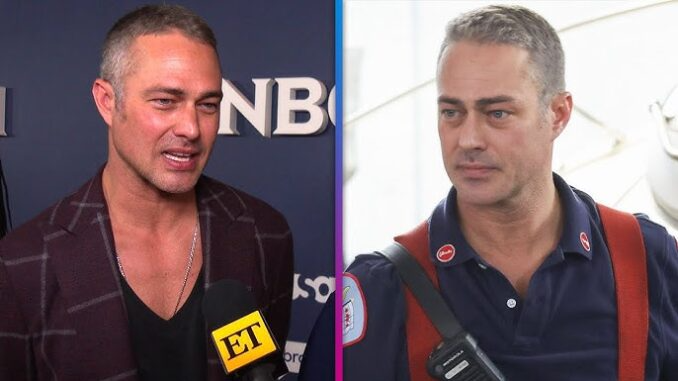
For more than a decade, Firehouse 51 has burned bright—not just with the roaring flames of Chicago’s emergencies, but with the raw humanity and quiet heroism of the men and women who call it home. At the center of that inferno stood Lieutenant Kelly Severide, a character so integral to the DNA of Chicago Fire that separating him from the series feels almost unthinkable. Rugged, magnetic, and endlessly complex, Severide was more than a firefighter; he was the beating heart of the show’s moral compass.
And yet, here we are. Taylor Kinney—the man who brought Severide to life with brooding charisma and steel-eyed resolve—is stepping away from Chicago Fire, citing personal matters. With that announcement, a decade-long era draws to a sudden, uncertain close. The news doesn’t just ripple across fandom—it sends shockwaves through the very narrative architecture of NBC’s flagship drama.
The Character That Defined a Franchise
From the pilot episode, Severide was the guy. The firefighter who would charge headlong into chaos without hesitation. The man who would wrestle danger into submission, then lean against a fire truck, flashing a grin that said everything would be okay—even when it wasn’t.
Kinney infused Severide with layers that transcended the archetype of the stoic hero. He was flawed—prone to brooding silences, impulsive gambles, and romantic entanglements that read like cautionary tales. But those imperfections made him human, tethering the show’s soaring heroics to something raw and real.
His mentorship of rookies like Blake Gallo showcased his innate ability to lead without pretension. His loyalty to Boden, Casey, and the crew of 51 forged a found family dynamic that elevated Chicago Fire beyond procedural boundaries. And then there was Stella Kidd. Played by Miranda Rae Mayo, Stella became more than a love interest—she was Severide’s equal, his anchor, his mirror. Their tumultuous journey from colleagues to spouses has been one of the most compelling threads in the series tapestry.
Behind the Badge: Why This Exit Hurts
Television thrives on continuity. Characters become constants in an unpredictable world, their arcs a comfort amid real-life chaos. Severide was that constant—a pillar for fans as much as for his fictional crew. So when the news broke that Kinney would take a leave of absence, the collective reaction was visceral: Why now? How long? What happens next?
The official reason—a personal matter—remains respectfully opaque. And perhaps it should. The truth behind the headlines reminds us that actors, like the roles they inhabit, carry private burdens we’ll never fully know. Just as Severide has spent seasons battling inner demons beneath a calm exterior, Kinney’s decision is a sobering reminder that life off-camera is not scripted.
The Narrative Fallout: A House Divided?
For the writers’ room, Kinney’s absence is more than a logistical challenge—it’s a narrative earthquake. Severide’s leadership isn’t a subplot; it’s a backbone. How do you recalibrate a show when its cornerstone suddenly disappears?
Will Severide be reassigned to an elite task force? Will he take a leave for training, leaving the door ajar for a triumphant return? Or will his exit be abrupt, echoing the unpredictable brutality of real life? And then there’s Stella. How does Kidd—a newlywed, a powerhouse in her own right—navigate a storyline built on absence? The ripple effects promise drama, but they also risk fracturing the emotional core that makes 51 feel like home.
The Real Impact: Fans on Edge
Chicago Fire isn’t just television; it’s a ritual for millions. Severide’s departure feels like saying goodbye to a friend who’s always shown up in our living rooms when the sirens blared. Social media has become a digital wake, with fans trading favorite clips, speculating on exit scenarios, and sending Kinney messages of solidarity.
It’s rare for an actor’s departure to provoke this level of response—but then, Kinney isn’t just any actor. His Severide was aspirational yet flawed, heroic yet human. He embodied the paradox of courage: strength laced with vulnerability.
The Legacy Burns On
What happens next remains cloaked in uncertainty. Whether Kinney returns after a season, or whether this marks a definitive goodbye, one truth is undeniable: his mark on Chicago Fire is indelible. Severide wasn’t just written—he was lived. Every smirk, every searing stare into a burning building, every moment of quiet introspection stitched him deeper into the fabric of the show.
And when the credits roll on future seasons, the silhouette of a man standing before an inferno—a man who faced fire with unflinching resolve—will haunt the frame. Because some characters don’t just leave; they linger, glowing in the embers.
🔥 Bottom Line: Taylor Kinney’s departure isn’t just a casting change; it’s a seismic shift that redefines Chicago Fire’s landscape. For now, the ladder Severide leaves behind stands empty, its rungs slick with the weight of memory. And for fans, one question burns brighter than all: When the fire reignites, will Kelly Severide return to climb it?